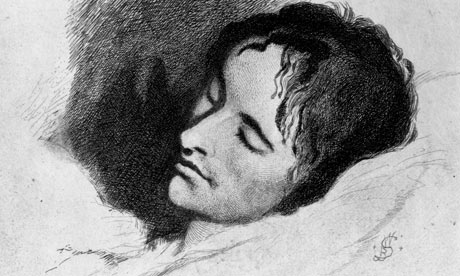
The agonies of John Keats's final months in Rome were partly the result of his doctor's misdiagnoses, according to a new biography.
When the poet arrived in Rome from London in November of 1820, Dr James Clark initially ruled that "mental exertions and application" were "the sources of his complaints" which seemed chiefly "situated in his Stomach". "Though Clark had 'some suspicion of disease of the heart and it may be of the lungs', he confidently predicted that 'if I can put his mind at ease I think he'll do well'," writes Sue Brown in her biography of Joseph Severn, the friend who nursed Keats until his death in a small room by the Spanish Steps in Rome.
When Clark finally diagnosed consumption, he put Keats on a starvation diet of just an anchovy and a piece of bread a day to cut the flow of blood to his stomach. "You cannot think how dreadful this is for me," Severn wrote to a friend. "The Doctor on the one hand tells me I shall kill him to give him more than he allows – and Keats raves till I am in a complete tremble for him."
Clark, who went on to be employed by Queen Victoria, also recommended heavy bleeding. On the morning of 9 December, when Keats woke and vomited two cups of blood, he bled his patient, taking away eight further ounces of blood.
"Keats's doctor didn't kill him but he didn't treat him very well," said Brown today. "That was medical ignorance [but] what was sad in Keats's case was three things. The bleeding pulled him right down, and also the near starvation was almost unforgivable. There were times when Keats was hallucinating for lack of oxygen and lack of
sustenance."
Her biography of Severn quotes from a letter her subject – an artist – wrote to friends, that Keats's "mind is worse than all – despair in every shape – his imagination – and memory present every image in horror so strong that morning and night I tremble for his Intellect ... How he can be Keats again from all this I have little hope."
The third cruelty, Brown said, was the lack of painkillers given to the poet. "They could have used opium in small doses, and Keats had asked Severn to buy a bottle of opium when they were setting off on their voyage. What Severn didn't realise was that Keats saw it as a possible resource if he wanted to commit suicide. He tried to get the bottle from Severn on the voyage but Severn wouldn't let him have it. Then in Rome he tried again," said Brown. "Severn was in such a quandary he didn't know what to do, so in the end he went to the doctor who took it away. As a result Keats went through dreadful agonies with nothing to ease the pain at all."
The poet was furious about the loss of the laudanum, throwing two cups of coffee at Severn and later turning his anger on Clark, asking the doctor whenever he appeared: "how long is this posthumous existence of mine to go on".
Brown said the tragedy was that Keats wasn't only suffering through physical anguish, but also with "mental anguish and emotional anguish". "When he died [on 23 February 1821], he died believing he had been a complete failure as a poet. It's unbearable really to think about that," she said. "There was also the pain, not of a failed relationship with Fanny Brawne, but of one which could never be consummated."

